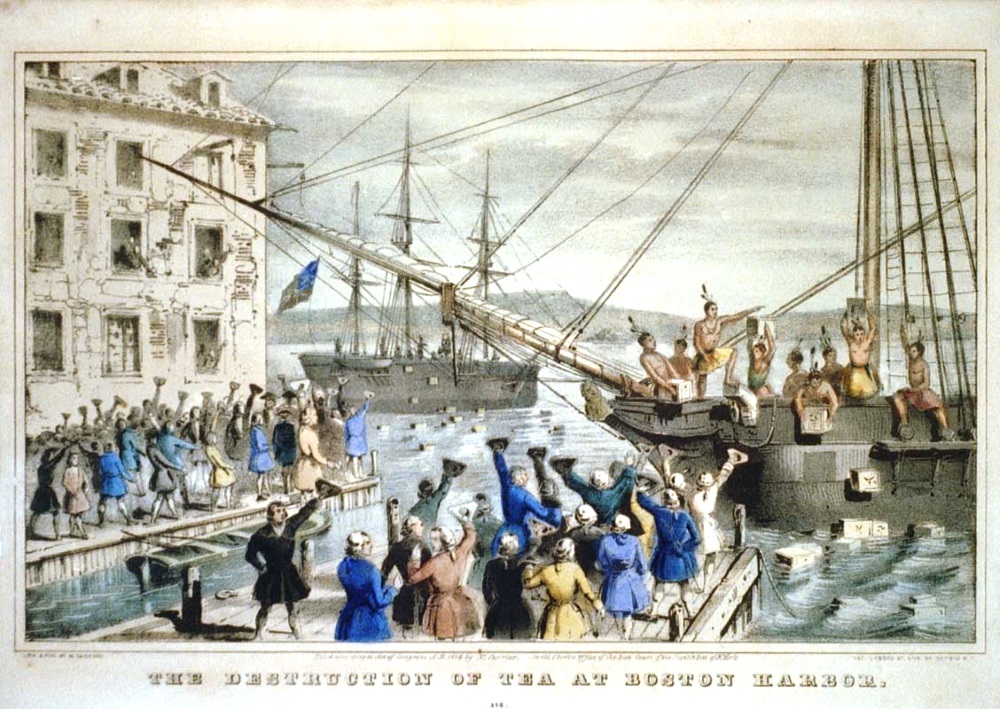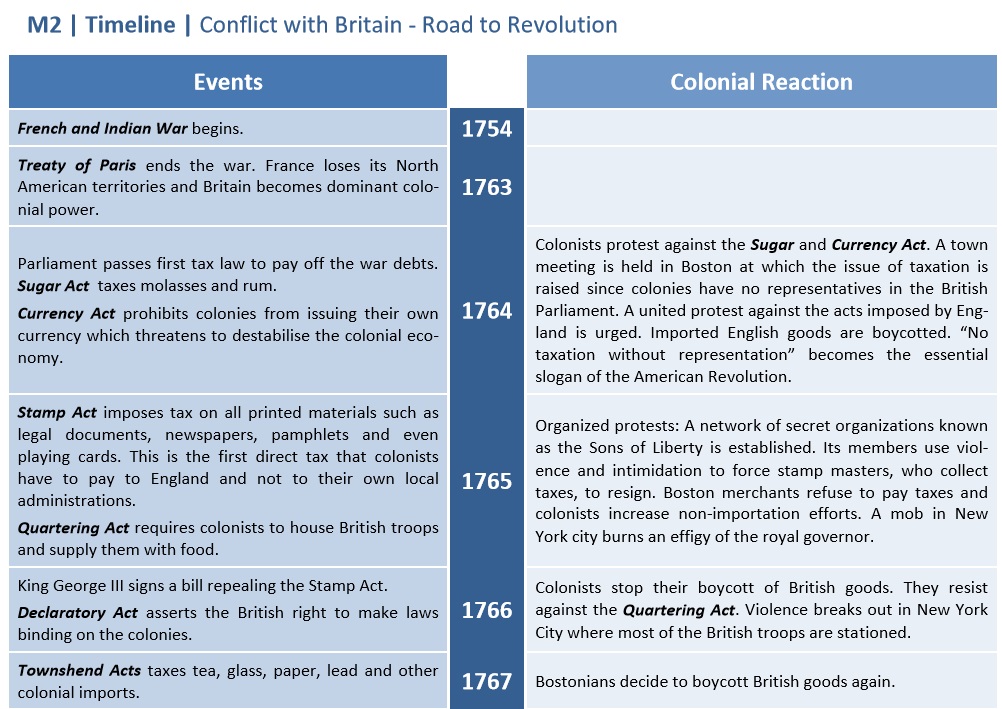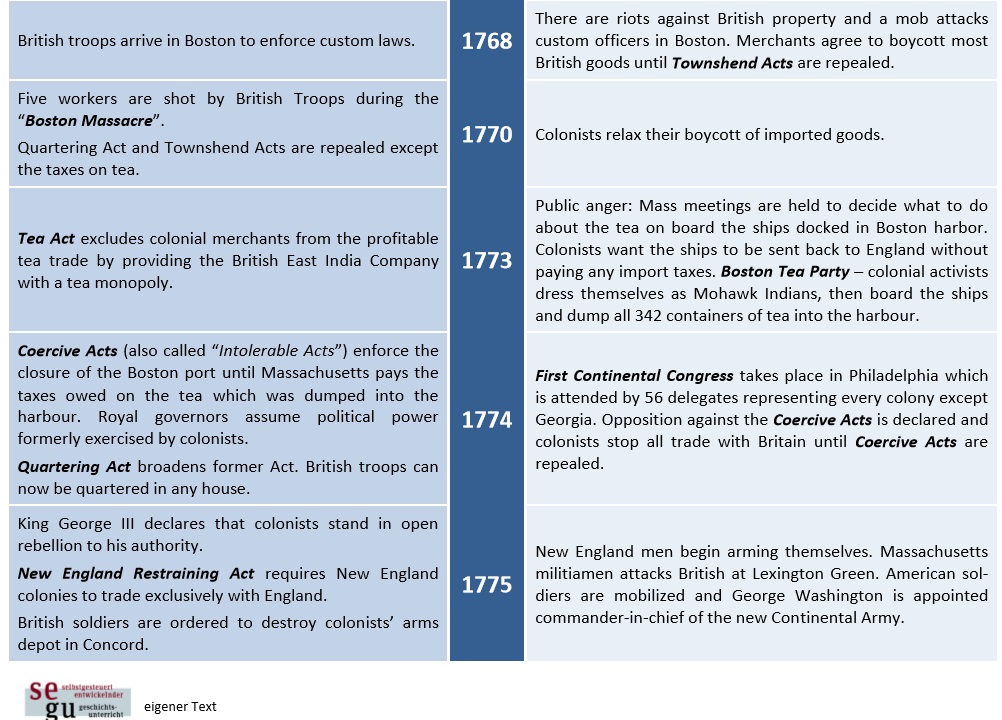American History | Modul 6 | Wissen | Protest und Aufstände | ◻◻ mittel | ca. 30 min | optionale vertiefende Aufgabe: 10 min
 Nathaniel Currier: Boston Tea Party, kolorierte Lithographie 1846 | Vollständiges Bild und Bildnachweis (Public Domain, Wikimedia): Bild anklicken
Nathaniel Currier: Boston Tea Party, kolorierte Lithographie 1846 | Vollständiges Bild und Bildnachweis (Public Domain, Wikimedia): Bild anklicken
Until 1763, the British government had interfered very little with the internal affairs of its thirteen North American colonies. The relationship between the American colonies and their English mother country changed, however, after the French and Indian War in which France lost the colony of Louisiana and the territories east of the Mississippi River.
Can the year 1763 be considered as a turning point in American colonial history?
M1 | Darstellungstext | The French and Indian WarBeing both interested in expanding their colonies in North America and the Caribbean islands, Great Britain and France were big rivals by the mid-1700s. The colonial powers saw an increase in territory as a means to increase their wealth and power. From 1756 to 1763 they fought against each other in the Seven Years War, which took place in both Europe and North America. The conflict in North America is called the „French and Indian War“ referring to the two main enemies of the British colonists: The royal French forces and the various indigenous forces that allied with them, although Britain also had allies amongst the Native Americans. The war was mainly fought along the frontiers separating New France from the British colonies, from Virginia in the South to Nova Scotia in the North. Even if most of the conflict had already been settled in 1760, the war officially ended with the signing of the Treaty of Paris in 1763 after the French had surrendered in Canada. According to the Treaty of Paris, the territory east of the Mississippi River and most of Canada had to be handed over to the British. Although the war was primarily motivated by the ambition to secure territorial control, its consequences were farreaching. Not only did the war put an end to the French rule in North America, which made Britain the dominant colonial power, its outcome also determined the fate of the British colonies as it sowed the seeds for the American Revolution. France and Britain both suffered financially because they had spent a lot of money in the war. lt nearly doubled Britain’s national debt to £138 million. Seeking ways to pay off the debts, the British Crown tried to imposes new taxes on its colonies. On the one hand, Englishmen living in England were already overtaxed and riots throughout England did not allow any further taxation whereas the American colonies were quite prosperous. On the other hand, the British felt that the colonists were supposed to pay off the debts since part of the money had been spent to defend the colonists against the French. The colonists protested against these taxes at once, claiming that the Parliament had no right to tax them as they had no elected members in the Parliament to represent them. One of the most important effects of the war was that the colonists had learned to unify against a common enemy and were now armed and experienced in leading armies. So when the colonists became more and more indignant at the taxes imposed on them, they already knew how to take up arms and had experienced men to lead them. |
Text basierend auf: French and Indian War (Wikipedia, Version 26.4.2014)
2 | Have a look at the timeline. It shows the most important events of the years before the American Revolutionary War including the various tax laws England imposed on its American colonies.
a) Solve the quiz.
Stichworte zum Modul Conflict with Britain | Geschichte | Geschichtsunterricht | Unterricht | Amrican History | USA | Amerikanisch britischer Krieg
| Die Antworten zu den Aufgaben kannst du entweder in deine Geschichtsmappe schreiben – ganz einfach mit Stift und Papier. Du kannst die Antworten aber auch in die Textfelder unter den Aufgaben eingeben und anschließend ausdrucken oder als pdf abspeichern. Klicke dafür auf das Drucker-Symbol. Hier erhältst du weitere Informationen. |


